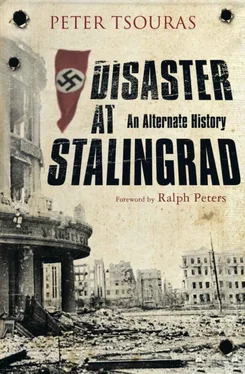Originally Raeder wanted the two battlecruisers refitted with 15-inch guns, but Hitler would not approve the resources required. Instead of a stay in German yards then, they were sent to Narvik in Norway, to join Destroyer Flotilla 8 and U-boat Flotilla 11, to complicate British efforts to escort convoys to Russia. 25The crews were none too happy about that. France had been the cushiest posting in the entire Wehrmacht, with good food, pleasant weather and friendly French women. In Narvik they were discovering what the crews of the capital ships and submarines at Trondheim already knew. The food was awful, the weather foul and the Norwegian women hated them.
Prague, Headquarters of the Reich Protector, 25 April 1942
Reinhard Heydrich savoured the man’s death. After all, it was Raeder who had driven him out of a promising career in the Navy over a trifling affair with a woman in 1931. That strait-laced prig had drummed him out of the Navy for dumping one woman for another. That was just what was wrong with the old Germany, too many ideas whose time had passed. Heydrich had given himself to the new Germany that swept away the past and organized itself around the shining ideal of the Volk, the master race, whose advantage was the only real morality.
He paused only long enough in feeding his hatred to consider that he actually owed the late Grossadmiral Raeder a thank you. If he had not been set adrift from the Navy, he would never have found the brilliant calling that was truly his. He was Reich Protector of Bohemia and Moravia, the choicest bits of the old Czechoslovakia. They called him the Blond Beast for the way he had crushed resistance in the protectorate and vastly increased war production. He fed the Czechs on plentiful carrots so their factories would continue to produce the torrent of high-quality weapons the Reich needed in its death struggle with the Bolshevik monster. When that task was completed, he had plans to ‘Germanize the Czech vermin’, but only after a rigorous racial classification of the population. He insisted that ‘making this Czech garbage into Germans must give way to methods based on racist thought’. That meant that up to two-thirds of the Czechs would eventually be deported to Russia or exterminated. 26
This assignment had been a reward for his excellent organizational work as the chief of the Sicherheitsdienst or Security Service of the SS. He had become the right-hand man of the head of the SS himself, Reichsführer Heinrich Himmler, to whom he was personally devoted for their shared vision, and was rewarded with the highest SS rank of Obergruppenführer. It was he, after all who had forged the documents that had fooled Stalin into believing his officer corps was plotting against him and caused him to murder 35,000 of them. It was he of whom the Führer himself had stated that, had he a son, it would be someone like Heydrich. Perhaps it was that Hitler saw the same ruthlessness in Heydrich that he found in himself, and for both of them this focused on the Jews. It was Heydrich who had organized the concentration camps and began the first large-scale killing of Jews, beginning with the invasion of Poland and the Soviet Union where his Einsatzgruppen killed by the hundreds of thousands. When that proved too slow, he had headed up a conference in the Berlin suburb of Wannsee in January 1942 to plan the organized extermination of all eleven million of Europe’s Jews.
He had more than enough malice left over never to overlook the opportunity to injure the Navy, repeatedly backing Himmler and Goring, in their power-play attacks. So no one was more surprised than Heydrich when he received a call from Admiral Karl Dönitz, Raeder’s successor, asking him to lunch. He was even more surprised at the naval honour guard that awaited him at Navy headquarters and the appearance of Dönitz himself as his car drove up. As their hands fell from their mutual salutes, Dönitz reached out to shake Heydrich’s hand. He was shocked to feel how soft and moist it was. He almost recoiled but mastered himself to grip it strongly. At lunch they were joined by a number of officers, all of whom had been Heydrich’s friends before his dismissal from the Navy.
It was clear that Dönitz was courting him. The man positively purred. Heydrich had nothing against him; Dönitz had had no part in the court of inquiry or taken a stand against him. In fact, Dönitz was a good Nazi Party man, an officer in Hitler’s favour not only for his savaging of Allied shipping but for his political enthusiasm. He was that combination almost all his other flag officers were not — efficient and National Socialist.
After coffee the rest of the officers excused themselves. Brandy was poured, and Dönitz got to the point — slowly.
Herr Obergruppenführer, it was the Navy’s loss that you were denied further service. But you have still been of great service. The Czech factories that you have taken in hand are providing vital components to the Navy. You can say that every Allied ship that slips under the water has been given a helping hand by you.
Heydrich’s cold face did not betray his annoyance. He thought that if he had known they were filling Navy orders, he would have put a stop to it. Just another way to torment Raeder. He was a man who enjoyed eating his revenge cold. But that dish was about empty. Raeder was dead, so what was the point? Perhaps there was advantage here. Dönitz was clearly there cap in hand.
‘It is time to let bygones be bygones. The Navy needs your help; said Dönitz. Ah, there it is, thought Heydrich. His blue eyes narrowed, and the faintest flicker of a smile broke his face.
CHAPTER 3
The Second Wannsee Conference

Headquarters, 1st Reserve Army, Moscow Region, 5 May 1942
The army staff learned quickly that their new acting commanding officer had more than just a sharp tongue. He was known to grab a man by the collar and shake him till his teeth rattled. Vasili Chuikov was a man to be reckoned with as he transformed this collection of reservists and cadre into a fighting formation. They would be needed soon, he knew, in the fighting that would erupt in the spring and flame all summer.
Chuikov dashed from his headquarters shouting for his driver. ‘Come on, Grinev, we’re going for the jugular!’ He had decided to relieve one of his division commanders, and the drama would rebound through the whole army as an object lesson in what Chuikov demanded from his subordinates. Grinev was waiting and leapt to the door of his Lend-Lease jeep for the boss. In seconds they were splattering mud on anyone close to the road. Time getting around was to be kept to a minimum, and Grinev was only too happy to comply as he shot down the road. He loved this American vehicle, so sturdy and reliable, and had become expert in manoeuvring down what the Russians shamelessly called roads.
Chuikov had not noticed that this time Grinev was drunk as the jeep gathered alarming speed. ‘Grinev, don’t drive so fast; Chuikov shouted. The jeep just kept going faster until it came to a bend in the road. Grinev lost control, and the jeep overturned. Chuikov awoke in hospital. The doctor told him he had injured his spine and that he had to stay on his back. He would write, ‘For a few days I lay on a special bed, strapped down by the shoulders and legs, being given traction treatment. However, healthy and hardy by nature, I was on my feet again in a week, though I walked with a stick.’ 1
The Crimean Front, 8 May 1942
Sappers and infantry of the Bavarian 132nd Infantry Division climbed silently into their assault boats on the beach east of Feodosiya on the southern flank of the Kerch Peninsula. It was the late evening of 7 May. They silently paddled down the coast in the dark until the German artillery exploded with a stunning barrage against the Soviet defenders of Kerch. Only then did the Bavarians turn on their motors whose noise was masked by the thunder of the guns. They entered the great water-filled antitank ditch that ran along the front right down to the sea. The Soviet infantry in their fighting holes did not have a chance as the Germans leapt from their boats, gunning them down.
Читать дальше













